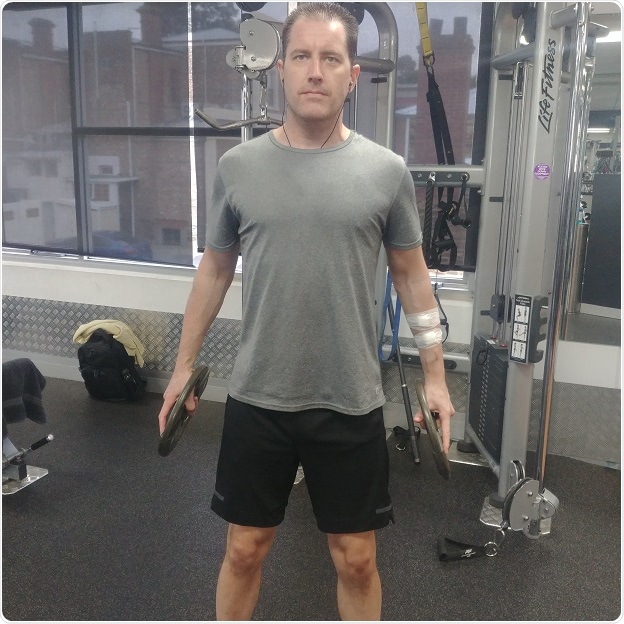On dialysis for kidney failure and assume swimming or sit ups are out of the question? Think again. New international guidelines have been released on the eve of Kidney Health Week showing how important it is for dialysis patients to incorporate physical activity into their daily lives.

Dialysis patient Dean Churcham demonstrates the benefits of regular exercise. Image Credit: UniSA
Led by renal expert UniSA Associate Professor Paul Bennett, the best practice guidelines developed by global clinicians, patients and researchers, outline activities that are safe for people receiving peritoneal dialysis to maintain and improve their quality of life.
The guidelines – a global first – give dialysis clinicians and patients clear advice about which exercises are safe or risky, how frequently they should be undertaken and what precautions are needed.
For too long, people on dialysis have been discouraged from exercising because of perceived barriers and uncertainty about the best exercise regime. But if we do not address this lack of physical activity, their independence and quality of life will suffer.”
Paul Bennett, Associate Professor, UniSA
Chronic kidney disease affects approximately 1.7 million Australians, but this number is expected to increase exponentially due to its links with type 2 diabetes, which accounts for 38 per cent of all new cases, and high blood pressure.
Other causes include immune diseases, congenital conditions, or genetic disorders, such as polycystic kidney disease.
“Few dialysis clinicians are exercise experts, which can be a barrier when recommending programs for their patients,” Assoc Prof Bennett says. “This is why involvement by exercise physiologists and physiotherapists in dialysis programs is imperative.”
Walking, cycling and core strengthening exercises such as swimming are recommended, as long as the catheter is covered and immobilized with tape to prevent it from getting wet, or from sweat seeping into the exit wound.
Any activities that cause abdominal strain, including sit-ups, should be avoided for several weeks after surgery, however core exercises under the supervision of an exercise professional may be beneficial for many patients.
“Exercises which improve abdominal strength are especially valuable because weak core muscles may increase hernia risks and place extra strain on the lumbar spine, particularly when accompanied by up to two liters of fluid in the peritoneal space.”
“Exercise doesn’t have to be vigorous. Even elastic fitness bands for resistance work can be used for frail, intermediate and high functioning dialysis patients to use at home.
“We also encourage people to keep working where possible. In addition, sexual activity can be important for many patients,” he says.
Assoc Prof Bennett says fitting physical activity into lifestyle routines, such as regular exercise for 20-30 minutes several times a week, is likely to improve a dialysis patient’s mental and physical health.
“Importantly, people receiving peritoneal dialysis can suffer from social isolation. Group exercise and activities can help if it is safe and evaluated on a case-by-case basis.”
To help explain the best exercise for kidney health, UniSA exercise physiologist Brett Tarca will give a free online session on Tuesday 8 March from 12ppm-12.30pm. People can register at https://bit.ly/3syNADH
Kidney Health Week runs from 7-13 March. For more details go to https://kidney.org.au/get-involved/kidney-health-week